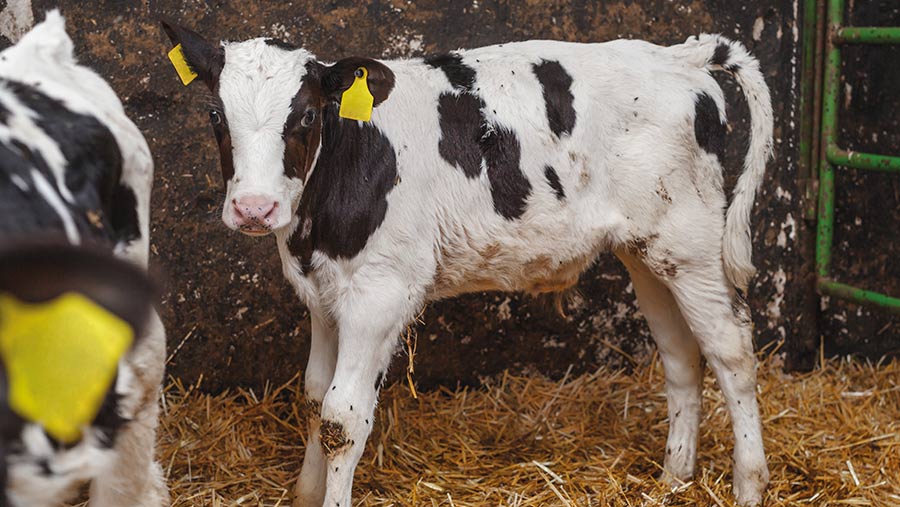Deadline set for mandatory BVD screening and culling in England
 © Volf Anders/Adobe Stock
© Volf Anders/Adobe Stock England’s cattle farmers have three years to take advantage of hand-holding and encouragement before basic management steps to control a devastating bovine virus hit the statute books.
This is according to the chairman of the BVDFree England initiative, Bill Mellor, who told Farmers Weekly mandatory rules on screening and culling to control bovine viral diarrhoea (BVD) are set to be phased in from 2025.
These rules would require farms to:
- Screen for BVD using tag and testing, or blood- or bulk milk-sampling
- Cull any calves born BVD-positive – known as persistently infected (PI)
- Enter data into a BVD England database that is intended to feed into the Livestock Information Programme (LIP).
See also: What can we learn from other countries about future BVD control?
This would broadly bring England’s BVD rules in line with those in Scotland, Northern Ireland, Ireland, Germany, and several other European countries. England’s BVD control steps are currently voluntary, as is the case in Wales, where the industry is working with the government to consider the adoption of legislation in 2023.
Consensus among leading vets and farmers in the seminar ring of Darlington Farmers Auction Mart for the National Beef Association Beef Expo (28 May) was for England to make BVD management compulsory to catch up with the rest of the UK.
But animal health experts warned the audience that such a move could change farmer attitudes to controlling BVD.
“Farmers can feel they are being ‘done to’, rather than worked with,” said UK chief vet Christine Middlemiss.
Derbyshire-based vet Sarah Tomlinson of Kingshay and the TB Advisory Service agreed, adding some of the challenges of TB control have arisen because the measures are required by law and farmers feel dictated to.
However, Orkney has claimed BVD-Free status for two years this spring and major reductions have been seen in other countries, including Scotland and Northern Ireland, where prevalence has fallen from 54% to 0.3%.
Defra disease priorities
- Tackle bovine viral diarrhoea, which costs the industry between £14m and £36m/year
- Reduce lameness and mastitis
- Upgrade housing, especially for calves, encouraging improvements in ventilation, cow comfort, loafing areas and enrichments (for example, scratching brushes)
- Improve pain management during disbudding, dehorning and castration through greater adoption of prolonged analgesia
- Improve the welfare of cattle at pastures through improvements in shelter, drainage, gateways and tracks
Low-hanging fruit
Mr Mellor said BVD was viewed by Defra as “low-hanging fruit” (see box above), with good tests, vaccines, a database and enough farmer desire to eradicate it. Latest figures show 43% (6,392 holdings) of the English breeding herd is signed up to BVDFree England.
“We have won the argument as far as making laws to control the disease goes,” he said. “Getting rid of BVD is better for herd productivity, lowering carbon footprint and reducing antibiotics use.”
“I eradicated BVD in just 12 months, through closing my herd, testing, vaccinating and improving my on-farm biosecurity. Today I have a BVD-accredited closed herd of pedigree Simmental cattle with one calf from each cow annually, little antibiotics use and no respiratory disease or scours.”
Annual vet visit
Businesses should capitalise on state aid while it is available through the Sustainable Farming Incentive’s animal health and welfare pathway, he added.
Mr Mellor, who has experienced the horrors of BVD first hand on his farm near Stockport, said farms should opt to work with vets to gauge BVD status now, rather than being forced to do it at their own cost later.
Defra has confirmed three years (2022-24) of funding for an annual vet visit. Basic Payment Scheme claimants with more than 10 cattle have £372 and a £522 a year for dairy and beef visits, respectively.
“Farmers can opt to use this how they wish, and the scheme is voluntary,” said Mr Mellor. “But for farms not up to speed with BVD on their farm, the funding will pay for on-farm testing and possibly a bit of further work to vaccinate or screen the herd.”
However, he stressed almost half the English breeding herd is signed up to BVDFree. For those farms, free vet reviews could be used to improve other aspects of health and welfare.
